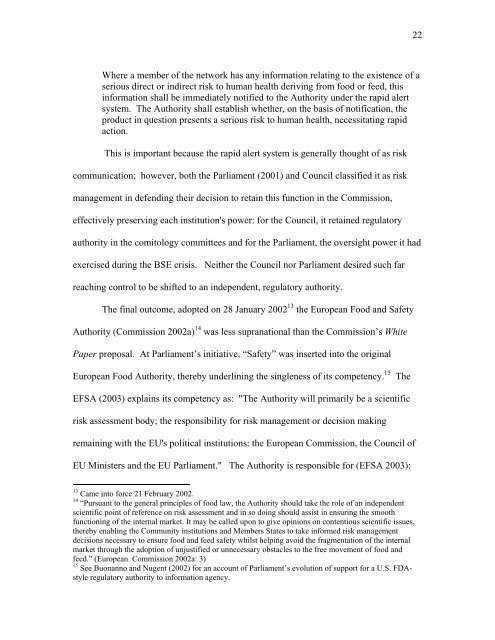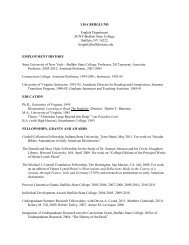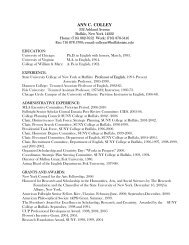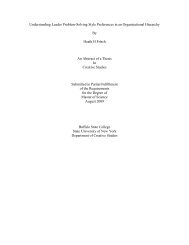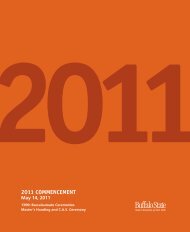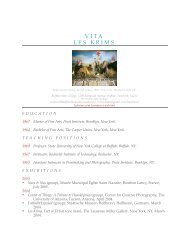POLITICS VERSUS SCIENCE: APPORTIONING ... - Buffalo State
POLITICS VERSUS SCIENCE: APPORTIONING ... - Buffalo State
POLITICS VERSUS SCIENCE: APPORTIONING ... - Buffalo State
Create successful ePaper yourself
Turn your PDF publications into a flip-book with our unique Google optimized e-Paper software.
Where a member of the network has any information relating to the existence of a<br />
serious direct or indirect risk to human health deriving from food or feed, this<br />
information shall be immediately notified to the Authority under the rapid alert<br />
system. The Authority shall establish whether, on the basis of notification, the<br />
product in question presents a serious risk to human health, necessitating rapid<br />
action.<br />
This is important because the rapid alert system is generally thought of as risk<br />
communication; however, both the Parliament (2001) and Council classified it as risk<br />
management in defending their decision to retain this function in the Commission,<br />
effectively preserving each institution's power: for the Council, it retained regulatory<br />
authority in the comitology committees and for the Parliament, the oversight power it had<br />
exercised during the BSE crisis. Neither the Council nor Parliament desired such far<br />
reaching control to be shifted to an independent, regulatory authority.<br />
The final outcome, adopted on 28 January 2002 13 the European Food and Safety<br />
Authority (Commission 2002a) 14 was less supranational than the Commission’s White<br />
Paper proposal. At Parliament’s initiative, “Safety” was inserted into the original<br />
European Food Authority, thereby underlining the singleness of its competency. 15 The<br />
EFSA (2003) explains its competency as: "The Authority will primarily be a scientific<br />
risk assessment body; the responsibility for risk management or decision making<br />
remaining with the EU's political institutions: the European Commission, the Council of<br />
EU Ministers and the EU Parliament." The Authority is responsible for (EFSA 2003):<br />
13 Came into force 21 February 2002.<br />
14 “Pursuant to the general principles of food law, the Authority should take the role of an independent<br />
scientific point of reference on risk assessment and in so doing should assist in ensuring the smooth<br />
functioning of the internal market. It may be called upon to give opinions on contentious scientific issues,<br />
thereby enabling the Community institutions and Members <strong>State</strong>s to take informed risk management<br />
decisions necessary to ensure food and feed safety whilst helping avoid the fragmentation of the internal<br />
market through the adoption of unjustified or unnecessary obstacles to the free movement of food and<br />
feed.” (European Commission 2002a: 3)<br />
15 See Buonanno and Nugent (2002) for an account of Parliament’s evolution of support for a U.S. FDAstyle<br />
regulatory authority to information agency.<br />
22


